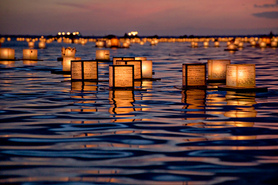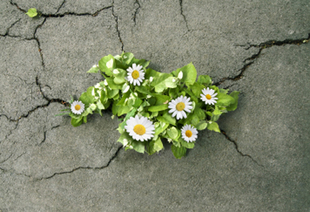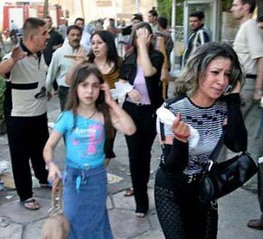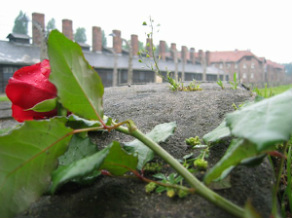
There don't seem to be many conflicts in the world that polarise people as much as the Israeli - Palestinian conflict, which I have heard described as the most persistent and intractable global conflict of modern times. To try to take a moderate view and see the situation from both sides is to appear a traitor to some. I'm sure many of my Christian friends think I am pro-Israel while my Jewish friends think I am pro- Palestinian as I try to see both sides in a dreadful situation in which there seems very often to be no real commitment to peace. Jews in this country are often held responsible for the actions of a secular government in the Middle East and while many of them do not agree with these actions they are hesitant about saying anything in public as they feel lsrael has very few friends. Many Jews of course do protest about the war and declare 'not in my name'. They are horrified at what is happening in Israel but they also support the need for security and the right of Israel to survive. Will there ever be peace in that land? And can we contribute to it?
I recently came across this article about a Palestinian, Bassam Aramin whose daughter Abir was killed in 2007 by Israeli border police and an Israeli Robi Damelin whose son David was killed by a Palestinian sniper in 2002. Together, they tour the world with The Parents Circle, an advocacy group whose members have lost close relatives to the conflict. They’re asking people not to take sides. According to them, when outsiders pick a side in the conflict and try to influence the situation on the ground from afar in divisive ways, they aren’t helping. As Robi Damelin has said, “Please do not take sides. Please do not be pro-Israel, do not be pro-Palestine, because what you are doing is feeling very good about yourself. But what you are doing is importing our conflict into your country and creating hatred between Jews and Muslims. And that doesn’t serve any purpose at all, and certainly doesn’t help us.”
Perhaps there is a message here on how to work for peace. And no doubt the statement from a Jewish and Muslim body, while recognising differences, shows a determination not to let those differences develop into hatred. The statement is so unprecedented that I think it's worth having it in full:
There is no doubt that Muslims and Jews have deeply held views about the conflict in Israel and Palestine. We acknowledge that our communities may disagree about the origins, current reasons and solutions to end the conflict. But there are also points of agreement.
The death of every civilian is a tragedy, and every effort should be taken to minimise such losses. The targeting of civilians is completely unacceptable and against our religious traditions. We pray for a speedy end to the current conflict and for a lasting peace for all.
In spite of the situation in the Middle East, we must continue to work hard for good community relations in the UK. We must not import conflict. We must export peace instead.
Whilst everyone has the right to voice their political opinion, be that in a rally or on social media, we must be mindful of how we convey our protest. There can be no excuse for racism, violence, or other forms of intimidation, when expressing views in the media, on the streets, outside shops or online.
We condemn any expression of Antisemitism, Islamophobia or any form of racism. We call for Muslim and Jewish communities to redouble efforts to work together and get to know one another.
We need constructive dialogue to limit our disagreements and identify the widest possible range of areas for cooperation. There are more issues that unite us than divide us.
May the God of Abraham grant our World more peace, wisdom and hope.
Not to import violence but to export peace instead - that's the work we are about in the belief and hope that it's effects will reach beyond our own boundaries. It is to offer the world an alternative voice and vision.





 RSS Feed
RSS Feed
